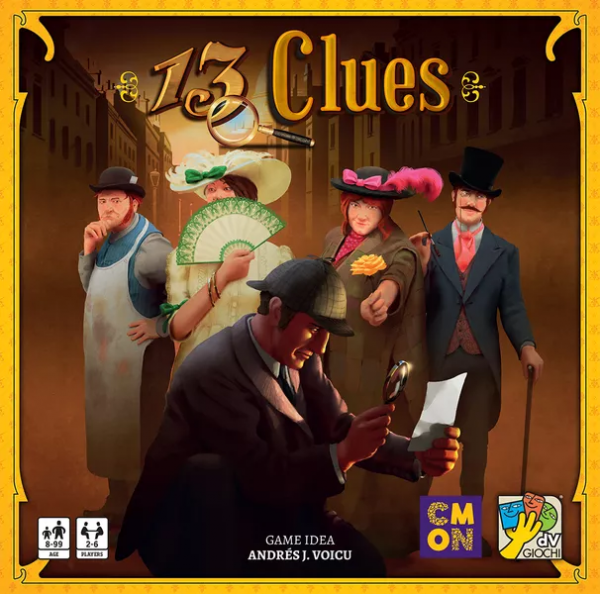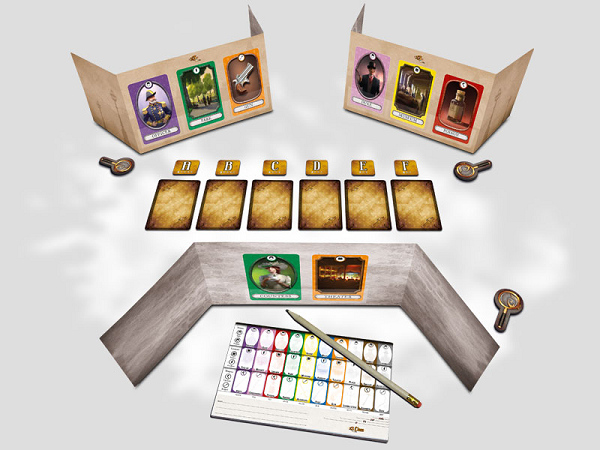Race To Be the Smartest Detective in 13 Clues

Players are racing each other to be the first to solve their own mystery. Ask the right questions to solve the crime!
Published by dV Games and designed for 2-6 players, 13 Clues is a light deduction card game.
Gameplay
Cards come in three different types: person, location, and weapon. The cards also come in different colors, with the number of different colors used varying based on player count.
At the start of the game each player is dealt one of each card type. All the remaining cards are then shuffled together and each player is dealt an additional two cards. You choose one card of each type and slide them into the screen of the player on your left so that he cannot see them, but you and everyone else can see what they are. These will be that player's case that he is trying to solve. You are trying to figure out which three cards are in front of you, given to you by the player on your right. You keep your remaining two cards a secret so that only you can see them. Any remaining cards in the deck are placed face-down in the center of the table: these are the secret informants. Every player is also given a casebook page. You can mark what cards you can see on this (the two cards you kept as well as the three cards in front of every other player), and use it to help you deduce your case. Finally, each player starts the game with a magnifying glass token.
On your turn, if you have no magnifying glass token, you take one from the general supply. Next, you must spend all your magnifying glass tokens. Each one you spend allows you to perform one action. Actions include consulting an informant, questioning a witness, or making an accusation.
When you consult an informant, you give your magnifying glass token to a player with none or to the supply if everyone has one. You then choose one face-down secret informant card and look at it.
If you question a witness, you give your magnifying glass token to another player and ask that player how many cards he can see of a particular color or category. There are two categories for each type of card. So, for example, location cards include outdoor and indoor cards, while weapons include up close and ranged. The player then looks at all the cards visible to him (the two cards in his hand and the cards he can see belonging to each player's case) and must truthfully answer the question. He does not take into account any cards he might have seen when consulting an informant.
For the final action, making an accusation, you again give your magnifying glass to any player who has none or to the supply, and then guess the person, location, and weapon you believe make up your case. You are not allowed to bluff by guessing any card you can't currently see. The other players look at the three cards in your case and tell you if you are correct, in which case you win the game, or if you are wrong. If you are wrong, your turn is immediately over and you discard any remaining magnifying glass tokens you may have to the supply, but you are not eliminated from the game. When you are wrong, you are not told how much of your guess was wrong.

Review
13 Clues is a pure and simple deduction game, with easy, accessible rules, and no player elimination. It's about trying to eliminate cards in as few guesses as possible, using both the clues given to you from your own questions as well as those given in response to other players. Which player you ask can have as much impact as what you ask.
It is interesting that when asking a question you give the player being asked your magnifying token. This was a thoughtful design choice since everyone at the table gets information from a question apart from the person being asked, and at the same time, having multiple tokens on your turn can be quite powerful, especially near the end of the game.
The theme is light but fun, with the mystery setting blending nicely with the deduction element of the game, while the artwork is quite nice and gives the game a fun setting. However, the icons for the different card categories could potentially be made a little larger for easier visibility.
While the game does scale fairly well, even having a pretty fun two-player mode which deduction games don't always offer, the six-player gameplay can be disappointing. With no secret informant cards on the table, the game is even more purely deduction based, with no luck element from which secret informant cards you happen to peek at. Also, there is so much information readily available and learned from each guess that the game could end before you even get a second turn.
If you enjoy light deduction games 13 Clues is easy to pick up and play and is good for a casual setting. It plays quickly and it's short enough that you can have back-to-back games. The deduction element is easy for players to grasp and, with the right player count, it comes together quite nicely.
Pros: Who you question is as important as what you ask, magnifying glass token system, play time
Cons: At the full player count the game can end much too quickly







